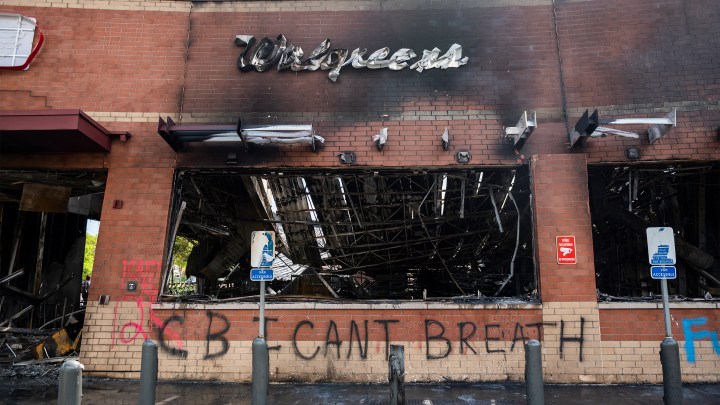
Neighborhoods where stores were destroyed become food deserts overnight
Neighborhoods where stores were destroyed become food deserts overnight

In many neighborhoods that have seen looting and vandalism over the past week, residents are now left with few — if any — grocery stores, pharmacies and other essential businesses. Which is made even harder by the fact that lots of stores are also closed because of the pandemic.
There’s a 6-mile long commercial corridor in South Minneapolis called Lake Street, and it has been destroyed.
“We no longer have pharmacies in our community,” said ZoeAna Martinez, who works for the Lake Street Council, a business association. “We no longer have gas stations as well. Our largest grocery stores are also gone,” Martinez said. “Right now, our community, we live in a food desert, which happened overnight.”
In Minneapolis and Saint Paul, hundreds of businesses have been damaged or burned to the ground. The same has happened in cities around the country.
![]()
Buildings burned during protests in Minneapolis.
(Beth Pearlman/Marketplace)![]()
“Pretty much half of a city block completely burned down Sunday night,” said Bea Rider, interim executive director of the New Kensington Community Development Corp., a neighborhood group in Philadelphia. Pharmacies, bodegas, clothing stores, check-cashing spots — all gone. And these losses hurt certain groups more than others.
“Low-income families who are underbanked, so they rely on check-cashing businesses, they’re definitely feeling a pinch,” Rider said.
Also, people who don’t have cars to drive to an intact store in the suburbs. And seniors who may have trouble getting around and who are more likely to need prescriptions filled.
“This is all in the background as the pandemic is still very much with us, and some businesses had curtailed certain degrees of operation because of that,” said Tabitha Montgomery, executive director of the Powderhorn Park Neighborhood Association in Minneapolis.
Community groups and churches are trying to fill the gap with donated supplies, but that’s a short-term fix. And Montgomery said she thinks the neighborhood will bear the scars of this moment for decades, even after the stores are rebuilt.
There’s a lot happening in the world. Through it all, Marketplace is here for you.
You rely on Marketplace to break down the world’s events and tell you how it affects you in a fact-based, approachable way. We rely on your financial support to keep making that possible.
Your donation today powers the independent journalism that you rely on. For just $5/month, you can help sustain Marketplace so we can keep reporting on the things that matter to you.




















